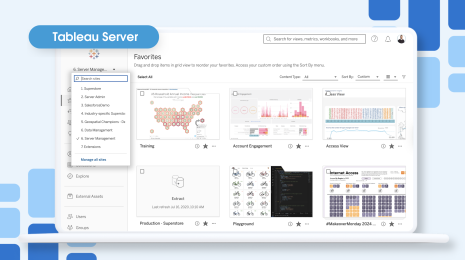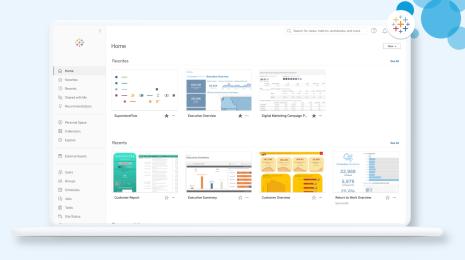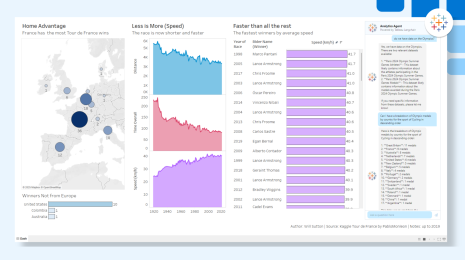Embracing your Tech Stack: Tableau Server Now Supports Windows Server 2022 and Linux Flavor of Your Choice
Tableau is all about giving you choices for how you want to tackle data analysis. It's super versatile, fitting right into the IT investments that your organization has. You've got options: stick with the tried-and-true Windows Server, go for the reliable Linux if you're into open-source, or choose the hassle-free Tableau Cloud for a fully managed SaaS experience. It's really up to you and what works best for your team. And now, we have even more options to help you build the most flexible analytics platform.
Run Tableau on the latest Windows release
Tableau Server is now compatible with Windows Server 2022, which brings a host of benefits to our customers. This update offers enhanced security measures that protect against modern threats to ensure the safety of your data analytics and visualizations. In addition, users can expect improved performance and reliability, as Windows Server 2022 is designed to process data more efficiently and provide faster analytics with minimal downtime.
This compatibility also keeps Tableau Server up-to-date with the latest technological advancements, ensuring our users have access to cutting-edge data analytics tools. Overall, our integration with Windows Server 2022 underscores our commitment to providing our customers with a secure, efficient, and technologically advanced data analytics platform. This new support comes with the 2023.3.1 maintenance release and is available for download today. Windows Server 2022 is not supported in versions prior to 2023.3.1. Installers for all versions of Tableau Server on Windows prior to 2023.3.1 will not allow installation on Windows Server 2022.
Support for new Linux distributions
Tableau Server’s support for Linux has been a success for customers. We added support for Linux in 2018 with the 10.5 release of Tableau Server. Supporting Tableau Server on Linux has allowed Tableau customers to take advantage of the stability, cost savings, and industry support Linux offers. In addition, this support created a strong foundation for other products, including Tableau Public, Tableau Cloud, and Tableau Server in a Container.
It's with great excitement that we share a pivotal development in our Linux journey. Our team has been diligently working behind the scenes, and we're now ready to unveil a significant expansion in our distribution support for Tableau Server on Linux. This enhancement is a testament to our deepened commitment to the Linux community and our users who rely on these systems.
As we roll out the forthcoming releases of Tableau Server, we're proud to present an extensive list of supported Linux distributions, catering to a broader audience and various enterprise environments. Our expanded support includes:
- Red Hat Enterprise Linux (RHEL) versions 8 and 9
- CentOS Stream versions 8 and 9
- AlmaLinux versions 8 and 9
- Rocky Linux versions 8 and 9
- Oracle Enterprise Linux versions 8 and 9
- Amazon Linux 2 and the latest 2023 release
- Ubuntu versions 16.04 LTS, 18.04 LTS, 20.04 LTS, and 22.04 LTS
This diverse range of Linux distributions ensures that no matter your preference or requirements, Tableau Server is ready to integrate seamlessly into your existing infrastructure, providing the powerful, flexible business intelligence capabilities you've come to expect from Tableau.
This expands our range of supported OSes and upgrades our version support for many already supported ones like OEL and Ubuntu. The above-listed distros are supported starting with the 2023.3.1 maintenance release and are available for download today. For more details see our documentation.
Crucial support for CentOS users
At the end of June 2024, CentOS 7 will go out of support. We know that many customers depend on CentOS 7 for their internal infrastructure. The end of CentOS 7 and the switch from CentOS to CentOS Stream has led many to think about their choice of Linux distro.
This pivotal moment has sparked a reevaluation among many customers reliant on CentOS 7 for their infrastructure backbone. Amidst this evolution and the approaching end-of-life deadlines, we've noted the concerns and queries regarding on-premises Linux distribution support. We're expanding our roster of supported operating systems to address this and support our customers' infrastructure investments. Our commitment is to provide a seamless and supportive transition, ensuring that our customers can navigate this change with the utmost confidence and minimal disruption to their operations.
Tableau support for future Windows and Linux distributions
Tableau's roadmap includes a renewed commitment to staying ahead of the curve with myriad operating systems that our customers may use. We will continue extending support for emerging Linux distributions as they're released to best serve our customers' needs. Concurrently, we're also streamlining our offerings by phasing out support for older versions of Linux that are reaching or have reached the end of their support life. At the same time, we are still finalizing the details regarding the phasing out of older distributions. Your enthusiasm for Tableau’s expanded Linux support mirrors our own, and we're thrilled to continue this journey with you, ensuring that the Tableau Server is available and optimized for your specific infrastructure needs.
Get started and download Tableau Server with the Tableau Server 2023.3.1 release, and seamlessly integrate the latest Tableau capabilities into your unique IT environments.










